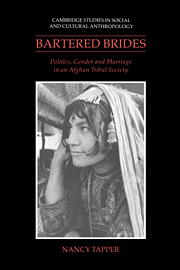Book contents
- Frontmatter
- Contents
- List of illustrations
- List of tables
- List of case studies
- Preface
- Acknowledgements
- Note on transliteration
- List of abbreviations and symbols
- Part I CONTEXTS
- Part II SOCIAL GROUPS AND MARRIAGE
- Part III IDEOLOGIES OF EQUALITY AND INEQUALITY
- Part IV CASE STUDIES AND STRUCTURAL IMPLICATIONS
- 10 The power of shame
- 11 The marriages of Hajji Adam's descendants
- 12 Durrani marriage — conclusions
- Notes
- References
- Index
- Cambridge Studies in Social and Cultural Anthropology
10 - The power of shame
Published online by Cambridge University Press: 29 August 2009
- Frontmatter
- Contents
- List of illustrations
- List of tables
- List of case studies
- Preface
- Acknowledgements
- Note on transliteration
- List of abbreviations and symbols
- Part I CONTEXTS
- Part II SOCIAL GROUPS AND MARRIAGE
- Part III IDEOLOGIES OF EQUALITY AND INEQUALITY
- Part IV CASE STUDIES AND STRUCTURAL IMPLICATIONS
- 10 The power of shame
- 11 The marriages of Hajji Adam's descendants
- 12 Durrani marriage — conclusions
- Notes
- References
- Index
- Cambridge Studies in Social and Cultural Anthropology
Summary
Maduzai conceptions of gender inequality and the inferiority of women are intimately related to their notions of honour and shame and responsibility. Together the system of ideas and practices constitutes a more or less closed ideology of control whose premises are unexamined and whose contradictions and anomalies are unnoticed. To the outsider, the contradictions and anomalies are particularly evident in relation to gender categories and roles.
As we have seen, Maduzai interpretations of honour and shame and Maduzai social identity depend on a precarious balance between two things: first, the unity of Durrani as an ethnic group which shares collective responsibility for maintaining their superiority through endogamy, and second, the ideal of the equality and autonomy of each Durrani household which constantly competes for the control of women as objects of exchange in marriage and as reproductive resources.
Thus, both the Durrani ethnic group as a whole and the Maduzai household are defined explicitly in terms of marriage and the control of women. It follows then that because these areas are central to the construction of Durrani identity and society, women, who have so little autonomy or control over their lives or the resources of the household in which they live, nonetheless have a certain power to subvert the social order.
- Type
- Chapter
- Information
- Bartered BridesPolitics, Gender and Marriage in an Afghan Tribal Society, pp. 207 - 239Publisher: Cambridge University PressPrint publication year: 1991



